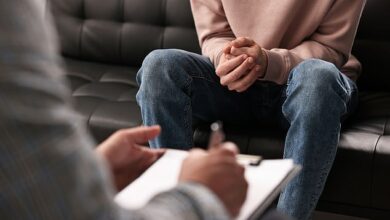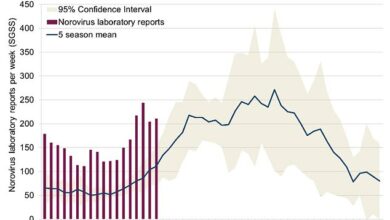As a physician, I have looked down on alternative medicine for many years. But after some surprising results, I made a U-turn: PROFESSOR ROB GALLOWAY


It will come as no surprise that I am a huge fan of modern medicine. From the 60-something man in cardiac arrest who we bring back to life with a defibrillator, to the teenager with appendicitis who gets better with emergency surgery, every day I see that Western medicine not only works well, but saves lives.
I used to think that modern medicine was the cure for all ills. I looked down on people who said they had benefited from alternative medicine such as acupuncture.
I chuckled softly when a patient told me how yoga, instead of sertraline, helped with their stress. And I chuckled at those who took vitamins or supplements for this or that.
Not only was alternative medicine not my thing, I found it a waste of money at best — and almost certainly harmful. But I can now announce a screeching U-turn.
Because for many patients, the approach that has been so indoctrinated into our medical psyche is clearly failing. For example, we have chronic pain patients who have been pumped full of addictive (and often ineffective) opioid painkillers, and insomnia patients whose sleeping pills have led to long-term dependency and ill health.

There is some evidence that acupuncture may be effective in treating gastrointestinal pain, migraines and menopausal symptoms
And let’s not forget the patients who take multiple medications for heart failure, high blood pressure and high cholesterol, to combat the side effects of an unhealthy Western lifestyle with too much processed food and too little exercise.
Although necessary, many of these medications have side effects and can be harmful.
A few months ago I treated a man who had fallen, which was a perfect example of the disadvantages of our current approach.
He was in his 80s and had dementia — and all the hallmarks of early Parkinson’s disease. He also suffered from back pain and insomnia and was given the opioid painkiller codeine, and zopiclone to help him sleep.
He had high blood pressure and was therefore also taking amlodipine. This drug lowers blood pressure, but can cause dizziness if you stand up quickly.
At 3 a.m., he got up to go to the bathroom. The combination of his medications slowed his reflexes, and when he slipped on a rug, he didn’t grab the railing in time. He fell, broke several ribs, broke an arm, and suffered extensive bruising all over his face.
For someone healthy, these injuries would be easy to treat, possibly without the need for hospitalization. But for him, it made it very difficult to live alone at home. After three weeks in hospital, he was discharged to a nursing home and lost his independence. The side effects of the medications he was taking were blamed.
Modern medicine claims that there was no alternative to these drugs and so we have to accept the side effects.
But over the last few years of my career, I have come to question this orthodoxy. A healthier lifestyle could certainly have prevented my patient from needing his amlodipine, but without his other medications, he would still have been in pain and sleeping poorly. Or so I thought.
Last month, a study published in the prestigious journal JAMA Network Open showed how effective acupuncture can be in helping patients with Parkinson’s disease sleep. (Two out of three sufferers suffer from insomnia.)
In the study, patients at Guangzhou University Hospital in China received acupuncture or sham acupuncture (using needles that do not penetrate the skin).
After four weeks of treatment, those who received real acupuncture slept significantly better.
The effect lasted for another four weeks. The quality of the trial was excellent and the statistical analysis showed that the risk of the results being due to chance was less than one in 1,000 (for a drug, we consider it to be effective if the results are due to chance are less than one in 20).
Despite the remarkable results, it was published without much fanfare. There was no pharmaceutical company to finance the publicity.
The new findings are consistent with a study of acupuncture in 72 patients with insomnia published in 2017 in the journal Sleep Medicine, which showed similar results.
I’ll be honest, I don’t know how it works. But does it matter?
Acupuncture has been used in China for thousands of years and the results have now been replicated using the best form of scientific experiment: randomized controlled trials.
It doesn’t fit the medical model I was taught – and teach – but the only conclusion we can draw is that the model I believed in is not entirely correct.
When I read about these studies, I started investigating whether acupuncture could work even better.
There are indications that it may be effective in treating gastrointestinal complaints, migraines and menopausal symptoms.
Crucially, it can also treat chronic pain, such as back pain, which I – like millions of others – suffer from and for which there are few effective treatments available.
The first review of studies on acupuncture for back pain was published in 2005 in the journal Annals of Internal Medicine and pooled the results of seven studies. It showed that acupuncture was as effective as other treatments such as opioid medications, but without the side effects.
But when I read the medical journals and undertook the continuing professional development that physicians must undergo, it was the profitable drug trials that were being shoved down my throat. The findings of acupuncture trials that “can’t be made” were ignored.
I am so impressed with the results of these acupuncture studies that I have made an appointment for later this week to see if it can help with my back pain.
It’s not just acupuncture. At a Royal College of Emergency Medicine conference this month, a report on a type of traditional Chinese medicine was named one of the 10 most influential papers published in the past year.
This caused amazement among the public, because the outcome was so unexpected.
The study, reported in JAMA, found that the traditional Chinese medicine tongxinluo — derived from plants and insects — taken after a heart attack led to a 36 percent reduction in outcomes such as stroke or death, compared with a placebo.
Both the treated group and the placebo group received the standard treatment, so we can only conclude that there was something in tongxinluo that had such a beneficial effect.
Again, we can’t simply dismiss these findings even though we don’t understand how it worked.
Of course, we must remember that an herb is an herb until it is proven to have a medical benefit, then it is called a medicine.
For example, digoxin and aspirin are life-saving drugs, but they were originally extracted from the foxglove plant and willow bark, respectively.
We need a randomized controlled trial in the UK to see if the results of this Chinese treatment also apply to the patients I treat.
And that brings me back to my turnaround: I believe in medicine – both mainstream and alternative – that works, as proven by the best available evidence.
This is not necessarily a randomized controlled trial — the gold standard. For example, we know the dangers of smoking and we advise against it. This is not based on randomized controlled trials, but on observations of what happens to smokers and nonsmokers.
But there are still a few no-go areas for me: homeopathy, for example, has never been proven to work in scientific studies. In fact, many trials have shown that it doesn’t work at all.
That’s why I take paracetamol for my bad back, do the exercises my physiotherapist recommended and am now also having my first acupuncture session.
@drrobgalloway




